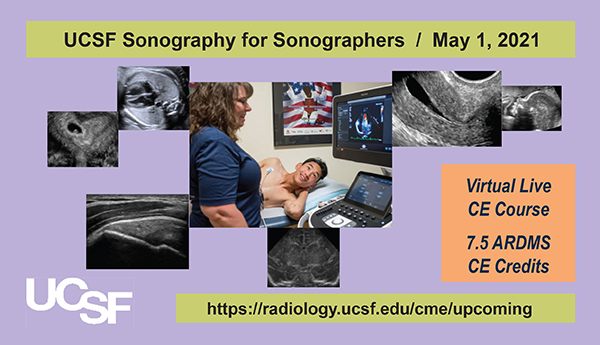Vickie Feldstein, MD Discusses “Sonography for Sonographers,” an Upcoming UCSF Radiology Virtual CME Workshop

Due to the COVID-19 pandemic, continuing medical education (CME) courses have moved online, providing a flexible, user-friendly way for learners to follow and comply with COVID-19 travel restrictions, keep up with CME requirements and still learn from top radiology experts. Each year, UCSF Radiology hosts “Sonography for Sonographers,” a CME course designed specifically for sonographers. After being cancelled in 2020, the course will be taught virtually for the first time in 2021. This is a great opportunity for sonographers nationwide to learn from UCSF Radiology and guest faculty.
Vickie Feldstein, MD, UCSF Radiology faculty member and specialist in diagnostic ultrasound has chaired this event for eight years. Her co-chairs are Chelsy Coco, RDMS, RT, chief sonographer and Liina Poder, MD, director of Ultrasound. Dr. Feldstein was interviewed about the upcoming virtual CME workshop for sonographers.
Why do sonographers have a need for this course?
At UCSF Radiology, we look for ways to provide on-going instruction, formal and informal, to the sonographers and others. To maintain certification with the American Registry of Diagnostic Medical Sonography (ARDMS), sonographers are required to complete 30 CME credits every three years. This year’s course to be held on Saturday, May 1, 2021 is pending approval for 7.5 CME credits by the Society of Diagnostic Medical Sonography (SDMS).
What is unique about this course?
There are many other ultrasound (US) meetings offered – most of which draw audiences comprised of radiologists, obstetricians/gynecologists and sonographers. “Sonography for Sonographers” at UCSF Radiology is unique because it is specifically designed for sonographers. We first hosted this course in 2010. It is a communal effort conducted by the entire Ultrasound section. Sonographers participate as planners, course chairs and lecturers.
Over the years, our audience has been very involved, invested and actively engaged. I have been energized by how eager and receptive the attendees have been. I expect the engagement we have experienced in the past will be present in this year’s course and I hope to expand our reach now that the meeting is accessible on-line.
Registrants have participated in surveys issued by the UCSF Radiology CME team and provided helpful feedback used by us to best design and structure the course offerings. Some of the topics and talks on the slate for 2021 were chosen to specifically respond to these requests. For example, Tara Morgan, MD will lecture about musculoskeletal (MSK) ultrasound. This topic is of great interest, particularly as it is a newer area of clinical application in many practices. Lisa Liu, RDMS and Deana Hammond, RDMS - principal sonographers on our team with special expertise in MSK US - will offer a “how to” demonstration.
Ruth Goldstein, MD and Andrew Phelps, MD, an invited guest speaker from Oregon Health and Sciences University (and former UCSF Radiology faculty) will open the program with back-to-back lectures about sonographic assessment of fetal brain abnormalities followed by a talk on neonatal head ultrasound. These paired talks were selected to address interest expressed by attendees in learning more about findings on prenatal obstetric exams and the postnatal correlation.
Dr. Poder will give a clinically relevant, helpful talk on how best to assess acute pelvic pain in a non-pregnant woman. The lecture slate includes Lori Strachowski, MD who will review ultrasound evaluation in the first trimester of pregnancy and explain current guidelines used to determine viability. Following that, Dorothy Shum, MD will speak about the US evaluation of post-partum bleeding, another common challenging indication. The last talk of the day will be given by Anita Moon-Grady, MD, director of the Fetal Cardiovascular Program at UCSF, on basic fetal cardiac assessment by ultrasound.
All presenters are widely known and highly regarded for their skills as ultrasound specialists and talented teachers.
How will this course help sonographers working in a clinical setting?
We are very intentional in drafting the 1-day program, in the choice of topics and speakers. The lectures are crafted with the audience in mind – aiming to make the content and delivery relevant and interesting to sonographers in busy practices. The presentations include technical “tips” and highlight potential pitfalls. Most importantly, we aim to address why certain sonograms are done and how the information is used.
We are motivated to recognize and support the demanding work done day-after-day by sonographers and offer clinical context to the information gleaned from the exams they perform.
What do you love most about leading this course?
Sonographers do very hard important work and they do it well. This course is a way to acknowledge and provide information - as a thank you. The appreciation and mutual respect between audience and presenters has been a highlight of this meeting. There is camaraderie and a sense of community. The teamwork is apparent as UCSF Radiology presenters include in their lectures compelling US examples that members of the audience obtained. The lecturers teach trainees, conduct research, and most importantly care for patients using images captured by sonographers. It is really gratifying to participate in this course – to recognize, honor and celebrate all that.
The one-day, virtual live workshop is coming up on Saturday, May 1, 2021, and registration is now open. Visit the course homepage for more information.
